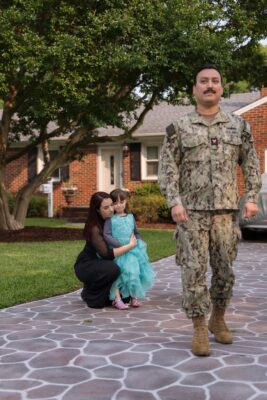Resilience During Deployment: Lessons From the Homefront
Written by Elizabeth Duenas
No matter what military branch your family is in, deployments are a heartbreaking part of military life. Unfortunately, missing important life events, from childhood milestones to a child’s birth, is a common side effect of long-term separations.
You don’t always get a playbook on managing such difficult situations when you join the military community. Learning from other spouses’ experiences has been the key to my survival through the difficult times that come with the military lifestyle.
In this article, I reflect on a conversation with Janis, a former Marine Corps spouse, mother, and grandmother, who took the time to share her wisdom shortly after I married my husband. Janis remained resilient through deployments, trainings, relocations, and life adjustments with her family. Now that her husband is retired, she reflects on how her family navigated the complex life adjustments and the time spent away from her husband.
“I Miss Your Messes”

I was new to military life when we first sat down to talk. I had no idea what to expect or what was ahead of me. I was sure that devastating separations would happen, but I wasn’t aware of how to manage them. I asked Janis how she dealt with being away from her husband for long periods.
She told me her husband would spend lots of time away for training, which was always hard, especially for her children. Janis advised me to stay busy and not let the sad feelings linger too long, but to revel in the small sentiments that keep us going.
Janis laughed and said, “Mark, my husband, would always say, ‘I miss your messes, because it means you’re not here to make them,’ and I would respond with, ‘When I roll over to your side of the bed in the morning and your pillow still smells like you, I am reminded of how much I miss you.” She mentioned how these simple moments allowed her to remain resilient and be a present mother for her young children.
I loved hearing this sentimental side of military life. As military community members, we often hear that we must remain brave, never let our guard down, stay busy, and stay distracted at all times. Hearing how Janis connected with her husband through even the smallest moments of vulnerability reveals that long-term separations don’t have to be spent suppressing every emotion you’re experiencing for the sake of resiliency. It’s okay to be vulnerable, especially in such a difficult situation.
Reflecting on Personal Challenges
It’s been a long road since I first talked with Janis about preparing for the military lifestyle, but her words and lessons remain. I reflected on her resilience through my own challenge of being separated from my husband while pregnant with our first child.
My husband left on rotation (non-combat deployment) while we were still unaware that I was expecting. Soon, the morning sickness came, along with all the other early pregnancy symptoms, and it was clear that I would be spending this new chapter of our lives without my spouse by my side.
It was difficult to grapple with at first. I spent a lot of time wondering how I would manage, yet somehow I did. Sometimes it felt like an endless uphill battle, but I learned a lot about managing situations like these in the future. Learning from other spouses like Janis has allowed me to become an even stronger person than I ever thought I could be.
How to Prepare for Military Separations

I was lucky to be able to rely on my conversation with Janis from the start of my time in the military community. However, long-term separations are challenging to prepare for, even if you’ve gone through one before.
Here is what I’ve learned after my first rotation away from my husband and how I got through it.
- Feel In Doses: Allowing yourself to feel and be vulnerable (like Janis) is an important coping mechanism that will help you get through. However, there has to be a balance. For the first 2-3 weeks after your spouse leaves, take the time to allow yourself to process your emotions fully. Then, switch to a different approach of letting yourself be vulnerable in small doses (i.e., taking an allotted time to let it out each week). This way, you can still be productive and not suppress all your feelings!
- Focus on Yourself: As challenging as it is to be apart from your spouse, use this time to focus on yourself and your children, if you have any. Try new hobbies, seek opportunities to put yourself out there, attend local events, and explore other activities. Try to find yourself through the challenge of missing your partner. Check your local Armed Services YMCA (ASYMCA) social pages to learn about upcoming events and volunteer opportunities.
- Rely on Your Support System: As someone who has difficulty relying on anyone but myself, I completely understand how daunting this task may seem, especially if your circle is small. Letting others know you’re struggling or need assistance is essential. Even if your family is far away, organizations like ASYMCA can support you whenever you need.
- Be Kind To Yourself: Staying busy and distracted is a great way to keep things moving, especially depending on how long your partner will be gone. However, you should make time to treat yourself and care for your mental health. Rent a comfort movie and order a pizza, take the kids to the library for some quiet reading time, or take advantage of ASYMCA’s childcare programs so that you can have a short break.
Remember that you’re not alone, no matter what situation you’re in, whether your support system is large or small. Deployments, rotations, and trainings can all be daunting challenges to overcome, but you’ve got this. You are resilient. You will make it.
ASYMCA’s Ongoing Military Support
So, we’ve talked about how difficult separations can be. We listened to former military spouse Janis’ advice about being vulnerable and resilient simultaneously. We discussed tools for staying sane during these situations. But how can we put all that we’ve learned to good use when we feel we have no support?
The ASYMCA offers countless ways to support you, whether or not you’re physically separated from your spouse. From food assistance to child education programs, and so much more, the ASYMCA is here to support your family’s resiliency.
One program, Operation Kid Comfort, was founded to help military children whose parent is deployed by gifting custom quilts that depict their favorite memories with their service member parent.
Being physically separated from a family member can be challenging for the whole family. In these difficult times, remember that you have made it through everything you thought you wouldn’t. You and your family are strong, resilient, and brave.
And remember, the ASYMCA is here for you every step of the way.

